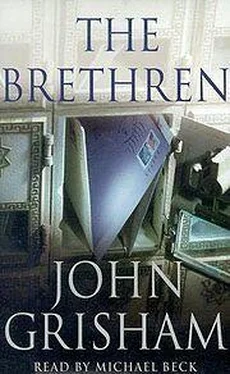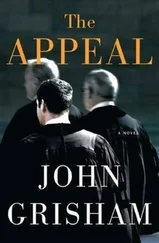John Grisham - The Brethren
Здесь есть возможность читать онлайн «John Grisham - The Brethren» весь текст электронной книги совершенно бесплатно (целиком полную версию без сокращений). В некоторых случаях можно слушать аудио, скачать через торрент в формате fb2 и присутствует краткое содержание. Жанр: Триллер, на английском языке. Описание произведения, (предисловие) а так же отзывы посетителей доступны на портале библиотеки ЛибКат.
- Название:The Brethren
- Автор:
- Жанр:
- Год:неизвестен
- ISBN:нет данных
- Рейтинг книги:3 / 5. Голосов: 1
-
Избранное:Добавить в избранное
- Отзывы:
-
Ваша оценка:
- 60
- 1
- 2
- 3
- 4
- 5
The Brethren: краткое содержание, описание и аннотация
Предлагаем к чтению аннотацию, описание, краткое содержание или предисловие (зависит от того, что написал сам автор книги «The Brethren»). Если вы не нашли необходимую информацию о книге — напишите в комментариях, мы постараемся отыскать её.
The Brethren — читать онлайн бесплатно полную книгу (весь текст) целиком
Ниже представлен текст книги, разбитый по страницам. Система сохранения места последней прочитанной страницы, позволяет с удобством читать онлайн бесплатно книгу «The Brethren», без необходимости каждый раз заново искать на чём Вы остановились. Поставьте закладку, и сможете в любой момент перейти на страницу, на которой закончили чтение.
Интервал:
Закладка:
Buster wanted to run, starting over there in the grassy field, to the treeline, through the woods to the country road where he wasn't sure what to do next. But if an insane banker could walk away and make it to Cocoa Beach, so could he.
"Why haven't you walked away?" he askedYarber.
"I've thought about it. But in five years they'll let me go. I can last that long. I'll be sixty-five, in good health, with a life expectancy of sixteen years. That's what I'm livin for, Buster, the last sixteen years. I don't wanna be lookin over my shoulder."
"Where will you go?"
"Don't know yet. Maybe a little village in the Italian countryside. Maybe the mountains of Peru. I've got the whole world to choose from, and I spend hours every day just dreamin about it."
"So you have plenty of money?"
"No, but I'm gettin there."
That raised a number of questions, but Buster let them pass. He was learning that in prison you kept most of your questions to yourself.
When Buster was tired of walking, he stopped near his Weed Eater. "Thanks, Mr.Yarber." he said.
"No problem. Just keep it between the two of us."
"Sure. I'm ready whenever you are."
Finn was off, pacing another lap, his shorts now soaked with sweat, his gray ponytail dripping with moisture. Buster watched him go, then for a second looked across the grassy field, into the trees.
At that moment, he could see all the way to South America.
TWENTY-FOUR
For two long, hard months Aaron Lake and Governor Tarry had gone head to head, toe to toe, coast to coast, in twenty-six states with almost 25 million votes cast. They'd pushed themselves with eighteen-hour days, brutal schedules, relentless travel, the typical madness of a presidential race.
Yet they'd worked just as hard to avoid a face-toface debate. Tarry didn't want one in the early primaries because he was the front-runner. He had the organization, the cash, the favorable polls. Why legitimize the opposition? Lake didn't want one because he was a newcomer to the national scene, a novice at high-stakes campaigning, and besides it was much easier to hide behind a script and a friendly camera and make ads whenever needed. The risks of a live debate were simply too high.
Teddy didn't like the thought of one either.
But campaigns change. Front-runners fade, small issues become big ones, the press can create a crisis simply out of boredom.
Tarry decided he needed a debate because he was broke, and losing one primary after another. "Aaron Lake is trying to buy this election," he said over and over. "And I want to confront him, man to man." It sounded good, and the press had beaten it to death.
"He's running from a debate." Tarry declared, and the pack liked that too.
"The governor's been dodging a debate since Michigan" was Lake's standard response.
And so for three weeks they played the he'srunning-fiiom-me game until their people quietly worked out the details.
Lake was reluctant, but he also needed a forum. Though he was winning week after week, he was rolling over an opponent who'd been fading for a long time. His polls and D-PAC's polls showed a great deal of voter interest in him, but mainly because he was new and handsome and seemingly electable.
Unknown to outsiders, the polls also showed some very soft areas. The first was on the question of Lake's single-issue campaign. Defense spending can excite the voters for only so long, and there was great concern, in the polls, about where Lake stood on other issues.
Second, Lake was still five points behind the Vice President in their hypothetical November matchup. The voters were tired of the Vice President, but at least they knew who he was. Lake remained a mystery to many. Also, the two would debate several times prior to November. Lake, who had the nomination in hand, needed the experience.
Tarry didn't help matters with his constant query, "Who is Aaron Lake?" With some of his few remaining funds, he authorized the printing of bumper stickers with the now famous question-Who is Aaron Lake?
(It was a question Teddy asked himself almost every hour, but for a different reason.)
The setting of the debate was in Pennsylvania at a small Lutheran college with a cozy auditorium, good acoustics and light, a controllable crowd. Even the smallest of details were haggled over by the two camps, but because both sides now needed a debate agreements were eventually reached. The precise format had nearly caused fistfights, but once ironed out it gave everybody something. The media got three reporters on the stage to ask direct questions during one segment. The spectators got twenty minutes to ask about anything, with nothing screened. Tarry, a lawyer, wanted five minutes for opening remarks and a tenminute closing statement. Lake wanted thirty minutes of one-on-one debate with Tarry, no holds barred, no one to referee, just the two of them slugging it out without rules. This had terrified the Tarry camp, and had almost broken the deal.
The moderator was a local public radio figure, and when he said, "Good evening, and welcome to the first and only debate between Governor Wendell Tarry and Congressman Aaron Lake." an estimated 18 million people were watching.
Tarry wore a navy suit his wife had selected, with the standard blue shirt and the standard red and blue tie. Lake wore a dashing light brown suit, a white shirt with a spread collar, and a tie of red and maroon and a half-dozen other colors. The entire ensemble had been put together by a fashion consultant, and was designed to complement the colors of the set. Lake's hair had received a tinting. His teeth had been bleached. He'd spent four hours in a tanning bed. He looked thin and fresh, and anxious to be onstage.
Governor Tarry was himself a handsome man. Though he was only four years older than Lake, the campaign was taking a heavy toll. His eyes were tired and red. He'd gained a few pounds, especially in his face. When he began his opening remarks, beads of sweat popped up along his forehead and glistened in the lights.
Conventional wisdom held that Tarry had more to lose because he'd already lost so much. Early in January, he'd been declared, by prophets as prescient as Time magazine, to have the nomination within his grasp. He'd been running for three years. His campaign was built on grassroots support and shoe leather. Every precinct captain and poll worker in Iowa and New Hampshire had drunk coffee with him. His organization was impeccable.
Then came Lake with his slick ads and single-issue magic.
Tarry badly needed either a stunning performance by himself, or a major gaffe by Lake.
He got neither. By a flip of the coin, he was chosen to go first. He stumbled badly in his opening remarks as he moved stiffly around the stage, trying desperately to look at ease but forgetting what his notes said. Sure he'd once been a lawyer, but his specialty had been securities. As he forgot one point after another, he returned to his common theme-Mr. Lake here is trying to buy this election because he has nothing to say. A nasty tone developed quickly. Lake smiled handsomely; water off a duck's back.
Tarry's weak beginning emboldened Lake, gave him a shot of confidence, and convinced him to stay behind the podium where it was safe and where his notes were. He began by saying that he wasn't there to throw mud, that he had respect for Governor Tarry, but they had just listened to him speak for five minutes and eleven seconds and he'd said nothing positive.
He then ignored his opponent, and briefly covered three issues that needed to be discussed.Tax relief, welfare reform, and the trade deficit. Not a word about defense.
The first question from the panel of reporters was directed at Lake, and it dealt with the budget surplus. What should be done with the money? It was a soft pitch, lobbed by a friendly reporter, and Lake was all over it. Save Social Security, he answered, then in an impressive display of financial straight talk he outlined precisely how the money should be used. He gave figures and percentages and projections, all from memory.
Читать дальшеИнтервал:
Закладка:
Похожие книги на «The Brethren»
Представляем Вашему вниманию похожие книги на «The Brethren» списком для выбора. Мы отобрали схожую по названию и смыслу литературу в надежде предоставить читателям больше вариантов отыскать новые, интересные, ещё непрочитанные произведения.
Обсуждение, отзывы о книге «The Brethren» и просто собственные мнения читателей. Оставьте ваши комментарии, напишите, что Вы думаете о произведении, его смысле или главных героях. Укажите что конкретно понравилось, а что нет, и почему Вы так считаете.












